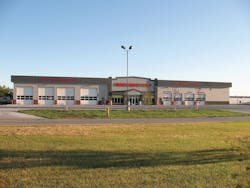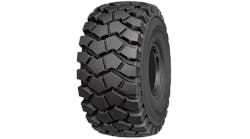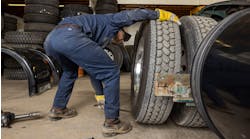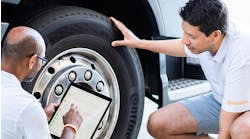In the last three years the economy has dealt Northwest Tire Inc. a pretty tough hand. Oil prices fell. The Canadian exchange rate tumbled, and farm commodity prices dropped. Those are three important pieces to the backbone of the Bismarck, N.D.-based tire business, and especially its commercial business.
Yet the 41-year-old tire dealership is thriving, expanding its footprint with new stores and adding locations in existing markets. In the North Dakota communities of Bismarck, Dickinson, Minot and Jamestown the company has opened truck and farm tire stores to accommodate more customers. By taking commercial tire service out of the existing stores in those communities Northwest Tire believes it is opening up more capacity in its retail bays, allowing both sides of the business to grow. “Our commercial business is up,” says Kory Grossman, the company’s vice president, who has spent the last 25 years working for Northwest Tire. He says the company is growing organically within its existing stores, and also with the addition of new locations.
Northwest Tire has 17 stores, and all but one of them is in North Dakota. (There’s a store in Bemidji, Minn., that does a combination of retail and commercial business.) Northwest Tire also has four wholesale locations and two Bandag retread facilities that cap medium truck tires.
The company’s commercial tire business is diverse. “We’ve got big national accounts all the way down to the farmer who has one truck,” Grossman says. “We don’t have the luxury of running only large fleets or only farmers, because they shut down for months.” The company needs to retain both kinds of customers.
And it has to do that work 365 days a year, no matter the weather. That’s a real issue for Grossman, as winter brings cold, wind and snow. In February 2018 the mean temperature in Bismarck was 8.6 degrees Fahrenheit. On the coldest night of this past winter, Jan. 13, the low temperature was -29 degrees F.
Grossman says it comes down to the company’s employees. “Our staff, that’s really the deal breaker.
“We have pretty good equipment, but if it’s not taken care of, it doesn’t matter. We are very proud of our staff and they do many things to plan for weather, especially when doing fleet service, service calls and after-hours calls.”
Those preparations are making sure the air lines on the company’s service trucks don’t freeze and using the correct viscosity index oil for the booms and hydraulic equipment. Service truck operators have to be careful with tire lubricants and mounting compounds because they can freeze onto the wheels and tires when mounting tires on site. Air guns get so cold technicians can’t touch them without wearing gloves.
The winter temperatures are a key driver in the design of Northwest Tire’s stores. “In almost all of our places you can get the truck inside, out of the elements,” Grossman says.“Our biggest challenge is, ‘When is it too cold to go out?’” There are times the wind is blowing 25 or 30 mph and the temperature is -25 degrees F. Grossman says those super cold snaps don’t usually last long, but there might be one week where it’s a real safety concern. And that’s when a customer’s brakes are more likely to freeze. Those calls for help usually don’t come in during regular business hours.
And it’s a rarity when Northwest Tire doesn’t take those calls.
“We’re out there when we shouldn’t be out there,” Grossman says, referring to the wicked winter weather. “But we’ve got to take care of the customer.”
Online sales
There’s probably one big thing standing in the way of truck tires and other commercial tires becoming a hot online commodity — their size. Even though there are online retailers who sell medium truck tires, and even bigger tires, Grossman doesn’t think FedEx or UPS drivers will be eager to load and unload them. It comes down to those “convenience issues,” he says.
Those who have talked about ordering online relay a list of concerns that keep them from pulling the trigger. “They have concerns about casing trades, prices are not always competitive, shipping costs, return freight, and handling them.” They don’t get too many installation requests for commercial tires bought online, he says.
Northwest Tire’s farming customers usually aren’t looking at tires online. They’re more likely to ask about different tires if they feel their current ones haven’t performed well. But if they’re satisfied with their tire performance, they’re brand loyal, Grossman says.
Large fleets are more versed on new products in the marketplace. Grossman says they see them in trade publications. “They don’t come into our stores and say, ‘I read about this XYZ brand online.’
“The average commercial customer has several people like us calling on them several times a week. They don’t have the desire to go online. They’re exposed more than the average (retail) customer.”
Tire trends
It’s probably not a surprise that truck drivers in North Dakota and Minnesota are focused on how their tires perform in the winter. Grossman says winter traction is an especially important trait with drivers of Class 4-7 trucks who run short hauls.
But Northwest Tire customers also are buying more 16-ply tires to accommodate trucks with heavier front axle ratings of 13,200 pounds, compared to the previous long-standing weight of 12,000 pounds. (The extra weight load has come as truck manufacturers have added equipment to comply with emissions regulations; it’s had a particular effect on the steer axle.) Grossman says there’s been “a migration” as customers have replaced 14-ply tires with 16-ply tires. The company’s truck tire customers are making a similar gradual migration to wide-base tires. But Grossman says they’re more apt to make that switch when buying a new truck. “We see more new equipment ordered with wide-base tires than changeovers,” Grossman says. And even then, it’s been a slow, gradual trend. “Fleets that can calculate or quantify the cargo savings to freight savings to either haul more or make less trips are eager to use ultra wide-base tires.”
Grossman is “an advocate for retreading,” and serves on the Bandag dealer council. He’s cautious when talking about the effects of low-cost import tires on the market. The company’s retread operations have been affected, but he says it’s difficult to measure a direct correlation. “It is hard to know the exact amount because of the change in business for the oil and farming businesses that has happened the last couple of years.” Grossman believes most fleets that have a tire program are tuned into the benefits of retreads. “I don’t think you can run a good tire program without including retreading.”
The company has a steady base of shoppers that specifically seek tires made in the U.S. — “about half of our customers.” At the same time, there is a market for imported tires.
In the last year, Grossman says Northwest Tire has expanded its offerings from the Bridgestone and Firestone brands, and also now carries the full lineup from Sumitomo.
Investing in equipment and employees
The tire dealership doesn’t switch brands often, but upgrading equipment is another story. “That’s endless,” Grossman says. Those decisions are driven by the need to be more efficient, and to keep employees safe.
“We’re buying tire trucks that have hands to handle bigger OTR tires. All of our commercial outlets have heavy-duty tire changers and balancers with lifts. We’re pulling double trailers to haul more tires.” He believes every company pickup truck has a hydraulic lift gate.
Grossman says four or five years ago service trucks cost $100,000. The last one he bought was $186,000.
All of those investments help Northwest Tire conduct business, but they also keep the company’s workers safe. “We do things so our employees aren’t 50 years old and their bodies are shot.”




